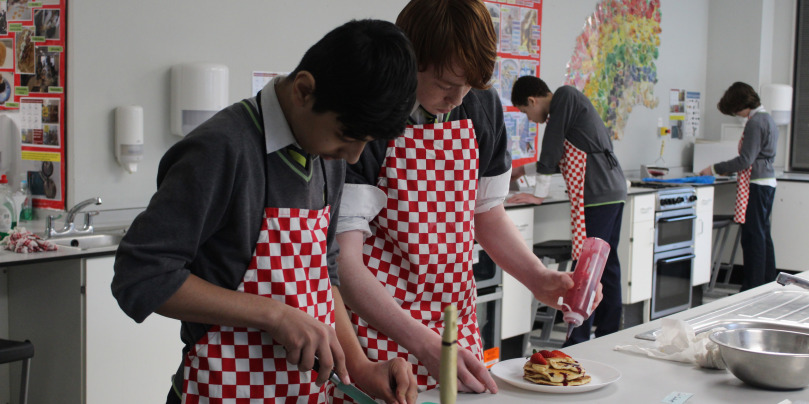
Food Preparation and Nutrition GCSE
You should choose Food Preparation and Nutrition if:
- You enjoy tasting, preparing and cooking new foods
- You thrive in a fast paced cooking environment and can manage your time effectively
- You have a passion for being creative with food
- You are intrigued at the science of food – how ingredients work individually and when combined
- You are able to demonstrate quick thinking and problem solving skills
- You are interested in the nutritional impact of food
- You are are interested in the environmental, social and moral impact of food
Careers
A GCSE in Food Preparation and Nutrition could lead to further qualifications and degrees related to Nutrition, Food Technology and Food Production which in turn could help you become a: Dietician, Nutritionist, Food Scientist, Food Manufacturing specialist, Chef, Catering Staff, Restaurant Manager, Food Technologist, Food Product Development Scientist, Food Safety Auditor, Food Writer, Restaurant Critic, Well-Being and Health Consultant – these are jobs that could see you working in all sorts of areas and across the world.
The Course
During the course you will learn:
- How to safely, independently and confidently prepare and cook a variety of dishes
- Understand which nutrients our body needs and how to have a balanced diet
- How to evaluate food based on the senses and how to effectively identify areas of improvement
- How to present food so that it looks appetising, but also considers portion control
- How to adapt recipes to suit a range of dietary requirements
- How to plan and produce a variety of dishes within a given amount of time
- Understand the working and scientific characteristics of each food group and their role within recipes
- How to maintain food safety when storing, preparing and cooking foods
You will also be able to:
- Show a variety of cooking skills
- Understand the function of ingredients in recipes
- Understand nutrition and the impact on the body
- Know the components of a balanced diet
How will you be assessed?
OCR’s GCSE (9–1) in Economics is a fully linear course and consists of two mandatory components that are externally assessed. There will be two question papers assessing the two components. Each question paper will have 20 multiple choice questions and short case studies with related short and medium response questions as well as the opportunity for extended writing (maximum of 6 marks).
| This will consist of: | |||
| Component 1 | 50% | Written exam | This component will consist of questions focused on six areas of content. |
| Component 2 | 50% | NEA (Non-Examination Assessment) | This component will consist of two assignments. Assessment 1: The Food Investigation Assessment - A scientific food investigation which will assess your knowledge, skills and understanding in relation to scientific principles underlying the preparation and cooking of food. Assessment 2: The Food Preparation Assessment - Prepare, cook and present a menu which assesses your knowledge, skills and understanding in relation to the planning, preparation, cooking and presentation of food. |






